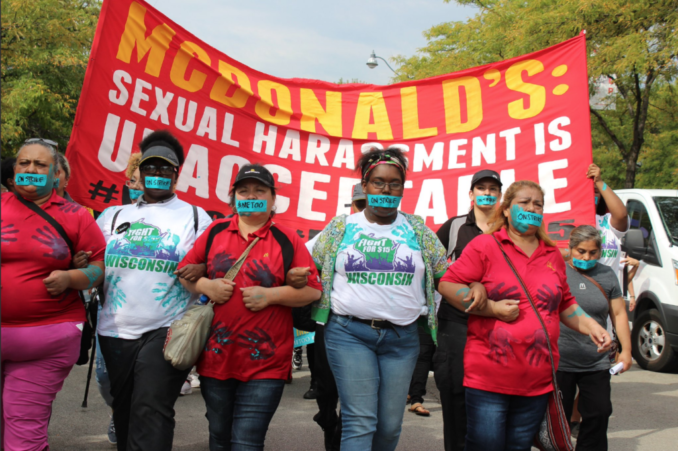McDonald’s workers take on sexual harassment with class action lawsuits
While hundreds of McDonald’s workers walked off the job in Michigan on Nov. 12 to demand a $15 per hour minimum wage, the right to unionize and an end to workplace sexual abuse, a class-action lawsuit was being filed in state court against the multibillion-dollar company.

Workers in Chicago protested sexual abuse at McDonald’s, Sept. 18, 2018.
Michigan McDonald’s workers and the American Civil Liberties Union charged the corporation with enabling a “systemic problem of sexual harassment” in its restaurants across the U.S. For years, employees have filed complaints against bosses who physically assaulted, verbally abused and demeaned them — and then retaliated if they resisted — with reduced work hours, unfair transfers and firings, or forced them to quit. Company officials ignored these grievances.
Jenna Ries, the named plaintiff and former McDonald’s employee, says a manager verbally and physically attacked her for two years at an eatery in Mason, Mich. When she resisted, he threatened to fire her. She constantly feared she would lose her job. Out of solidarity with “countless survivors” of sexual harassment at McDonald’s workplaces, Ries took legal action.
The lawsuit charges that Mason restaurant’s managers ignored heinous harassment and assault, which represents a pervasive “toxic work culture” emanating from the “very top.” It cites McDonald’s CEO Steve Easterbrook’s ouster a week earlier for violating company policy by having an inappropriate relationship with a “subordinate.” No surprise: Easterbrook got a multimillion-dollar exit payment.
The ACLU press release quotes Gillian Thomas, senior staff attorney at the organization’s Women’s Rights Project: “McDonald’s says it is powerless to stop the sexual harassment occurring in its franchise restaurants. That would be laughable if it weren’t so destructive to tens of thousands of workers being left to fend for themselves. We are taking McDonald’s to court to demand it use its immense power to address [this] pervasive abuse.” (Nov. 12)
Eve Cervantez, an attorney for McDonald’s workers, added: “McDonald’s is among fast food’s worse offenders when it comes to protecting the workers who make the company’s success possible. Employees should not have to endure violations of their humanity and bodily autonomy, as the price of a paycheck.”
Let the workers lead!
The lawsuit seeks $5 million to compensate workers at the Mason eatery, implementation of “worker-centered anti-harassment policies, worker-led mandatory training,” and “a safe system of reporting [abuse], investigation, discipline and protections against retaliation.” (laborpress.org, Nov. 13) These policies would be implemented in all its franchises — 93 percent of McDonald’s restaurants.
Jamelis Fairley, a Fight for $15 movement leader and McDonald’s worker in Sanford, Fla., insists that new McDonald’s CEO, Chris Kempezinski, hear worker-survivors’ stories and let them and their advocates direct the solutions. She stresses that nothing can change for the workers without their involvement.
Lois Jones experienced six months of relentless sexual misconduct at a Durham, N.C., restaurant. After reporting it, managers accused her of lying and contemptuously called her “stupid.” Jones strongly advocates unionization to protect fast food workers from abuse.
The effort to combat workplace sexual harassment has intensified since the #MeToo upsurge began two years ago, inspired by the movement’s African-American founder and organizer, Tarana Burke. Fight for $15 joined the workers in this struggle.
Courageously, Black, Latinx and im/migrant McDonald’s workers led a 10-city walkout in the first multicity strike in the U.S. against workplace sexual harassment on Sept. 18, 2018. Lacking union membership, they took great risks. Their bold action inspired many workers.
McDonald’s workers continue to fight the scourge of sexual abuse, taking on the world’s second-largest employer. Whether in the streets or in the courts, they keep the struggle going. Their message: No one should have to face sexual assault to earn a living!

